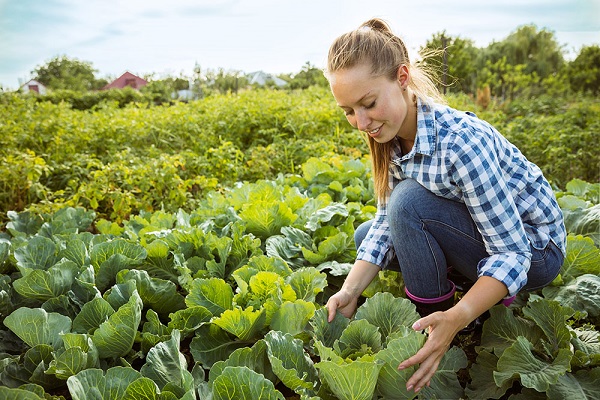The United States, with its vast agricultural landscape, offers numerous opportunities for individuals seeking employment in the agricultural sector. Farm worker jobs in USA have become increasingly attractive for both domestic and international job seekers, particularly due to the availability of visa sponsorship programs. These programs enable foreign workers to legally come to the United States and contribute to the country’s thriving agricultural industry.
In this post, we will explore the realm of farm worker jobs in USA with a specific focus on visa sponsorship. We will discuss the significance of these opportunities, the benefits they offer to both workers and the agricultural industry, and the key factors that make USA an enticing destination for those looking to build a career in farming and related sectors. Additionally, we will delve into the various types of visa sponsorship programs available to foreign farm workers, shedding light on the application process and requirements.
Whether you are an aspiring farm worker from another country seeking to pursue your dreams in the American heartland or an individual interested in the pivotal role that agriculture plays in the nation’s economy, this topic will provide you with valuable insights into the world of $42,000+ farm worker jobs in the USA with visa sponsorship. It encompasses not only the practical aspects of securing such employment but also the broader societal and economic implications of this thriving industry in the land of opportunity.
Types Of Farm Worker Jobs In USA
Farm worker jobs in USA encompass a wide range of tasks and responsibilities within the agricultural industry. These jobs can vary depending on the type of farm, the season, and the specific crops or animals being raised. Here are some common types of farm worker jobs in USA:
1. Farm Laborer:
Farm laborers are involved in various general tasks such as planting, weeding, harvesting, and packing crops. They may also be responsible for maintaining and repairing farm equipment and facilities.
Harvest Worker:
Harvest workers specialize in the collection of mature crops. This can include fruit picking (e.g., apples, berries, citrus fruits), vegetable harvesting (e.g., tomatoes, lettuce), or the harvest of grains like corn and wheat.
Livestock Caretaker:
Workers in this role are responsible for the care and management of livestock, such as cattle, poultry, pigs, and sheep. Their duties may involve feeding, milking, herding, and cleaning animal housing.
Dairy Farm Worker:
Dairy farm workers focus on the production of milk and dairy products. They operate milking equipment, monitor animal health, and assist with the care of dairy cows.
Farm Machinery Operator:
Farm machinery operators drive and maintain various types of farm machinery, including tractors, combine harvesters, plows, and irrigation equipment. They are essential for mechanized farming operations.
Irrigation Worker:
These workers manage irrigation systems to ensure that crops receive adequate water. Their responsibilities may include installing, maintaining, and repairing irrigation equipment.
Greenhouse Worker:
Greenhouse workers cultivate plants in controlled environments. They may be responsible for seeding, transplanting, watering, and maintaining plant health.
Farm Manager:
Farm managers oversee the day-to-day operations of a farm. They make decisions related to planting, harvesting, animal care, and staffing. They may also handle administrative tasks like budgeting and record-keeping.
Poultry Farm Worker:
Workers on poultry farms care for chickens, turkeys, and other birds. Their tasks can include feeding, egg collection, and maintaining clean and sanitary conditions in the poultry houses.
Vineyard Worker:
Vineyard workers are involved in the cultivation of grapes for wine production. They help with pruning, trellising, harvesting, and general vineyard maintenance.
Beekeeper:
Beekeepers are responsible for the care and management of bee colonies. They collect honey, beeswax, and other bee products and ensure the health and productivity of the bees.
Aquaculture Worker:
Aquaculture workers are involved in fish and seafood farming. They feed and monitor fish, maintain aquaculture facilities, and assist with harvesting and processing.
Crop Scout:
Crop scouts inspect crops for signs of pests, diseases, and other issues. They provide valuable information to help farmers make informed decisions about pest control and crop management.
Organic Farm Worker:
Organic farm workers focus on farming practices that meet organic standards, including the use of organic fertilizers and pesticides. They may also engage in crop rotation and soil health management.
Seasonal Farmworker:
Many farm worker positions are seasonal, with tasks varying by the time of year and crop cycles. Seasonal workers often move from one farm to another as needed.
Types Of Visas To Apply For When Seeking Farm Worker Jobs In USA With Visa Sponsorship
If you’re seeking farm worker jobs in USA with visa sponsorship, there are several visa options available to you. The most common visas for temporary agricultural work in the United States are H-2A visas and J-1 visas. Here is an overview of these visa types:
H-2A Visa:
- The H-2A visa is a temporary agricultural worker visa for foreign nationals.
- To be eligible for this visa, you must have a valid job offer from a U.S. employer who is willing to sponsor you.
- Your employer must demonstrate that there are not enough U.S. workers available to fill the job positions and that hiring foreign workers is necessary.
- The H-2A visa is typically granted for a specific agricultural season or time period.
- It is a non-immigrant visa, meaning it does not lead to permanent residency (green card) in the United States.
J-1 Visa (Exchange Visitor Visa):
- The J-1 visa program includes a category for agricultural workers, known as the J-1 Agricultural Exchange Visitor Program.
- It allows foreign individuals to come to the United States for a specified period to participate in agricultural exchange programs.
- This visa is often used for temporary or seasonal agricultural work.
- J-1 visa holders are expected to return to their home country after their program ends, making it a non-immigrant visa.
H-2B Visa (Limited Availability):
While the H-2B visa is not specifically for agricultural work, it can be used for non-agricultural temporary or seasonal jobs, such as landscaping or forestry.
It may be an option if you are looking for work in a related field that is not strictly agricultural.
Requirements To Apply For $42,000+ Farm Worker Jobs In USA With Visa Sponsorship in 2025
To apply for farm worker jobs in the USA with visa sponsorship, there are specific requirements and steps you need to follow. The H-2A visa is the primary visa program that allows U.S. employers to bring foreign agricultural workers to the United States for temporary agricultural work. Here are the general requirements and steps for applying for farm worker jobs in the USA with visa sponsorship:
1. Employer Sponsorship:
You cannot apply for an H-2A visa on your own. An eligible U.S. employer must sponsor you. The employer must demonstrate a need for foreign agricultural workers and meet specific requirements.
2. Temporary or Seasonal Agricultural Work:
The work you’ll be performing must be temporary or seasonal in nature. It should be directly related to agriculture, such as planting, cultivating, harvesting, or packing crops.
Job Offer:
The U.S. employer must provide you with a job offer, including details about the position, work location, hours, wages, and the duration of employment.
Labor Certification:
The employer must obtain a temporary labor certification from the U.S. Department of Labor (DOL). This process requires the employer to show that there are not enough qualified U.S. workers available and willing to perform the job.
Visa Application:
After obtaining the labor certification, the employer will file a petition on your behalf with the U.S. Citizenship and Immigration Services (USCIS). If approved, you will be issued an H-2A visa.
Background Checks:
You may be subject to background and security checks as part of the visa application process.
H-2A Visa Interview:
You will need to schedule and attend an interview at the U.S. embassy or consulate in your home country. Be prepared to provide documentation and answer questions about your intended employment.
Health Examination:
Some applicants may be required to undergo a medical examination to ensure they are in good health and free from certain communicable diseases.
Proof of Ties to Home Country:
You must demonstrate that you have strong ties to your home country, such as family, property, or a stable job, to show that you intend to return after your visa expires.
Valid Passport:
You need a valid passport that will not expire for at least six months beyond your intended stay in the United States.
Return Transportation:
The employer is responsible for providing return transportation to your home country once your work period ends.
Wages and Working Conditions:
The employer is required to provide you with fair wages and working conditions, as per the H-2A program regulations.
Required Documents To Apply For Farm Worker Jobs In USA With Visa Sponsorship
To apply for farm worker jobs in the USA with visa sponsorship, you will need to follow certain procedures and provide specific documents. Visa sponsorship for farm workers typically falls under the H-2A visa program. Here are the required documents and steps to apply for such jobs:
1. Job Offer:
First and foremost, you need a job offer from a U.S. employer who is willing to sponsor you for an H-2A visa. The employer must demonstrate that they cannot find qualified American workers to fill the position.
2. Labor Certification:
Your U.S. employer must obtain a labor certification from the U.S. Department of Labor (DOL). This certification confirms the need for foreign agricultural workers and the terms and conditions of the job.
3. Visa Petition:
Your employer should file Form I-129, Petition for a Nonimmigrant Worker, with U.S. Citizenship and Immigration Services (USCIS) to request approval for your H-2A visa.
4. Visa Application:
Once the petition is approved, you can apply for an H-2A visa at the nearest U.S. embassy or consulate in your home country.
5. Required Documents for Visa Application:
- Passport valid for at least six months beyond your intended period of stay in the U.S.
- A copy of your approved Form I-129.
- A copy of the labor certification from the DOL.
- A job offer letter from your U.S. employer detailing the terms and conditions of your employment.
- Proof of any required qualifications or experience for the job.
- A completed DS-160 visa application form.
- A visa application fee receipt.
- A recent passport-sized photograph.
- Any additional documents required by the U.S. embassy or consulate.
6. Visa Interview:
Attend an interview at the U.S. embassy or consulate in your home country. During the interview, be prepared to discuss your job offer and demonstrate your intent to return to your home country after your work contract in the U.S. ends.
7. Health Insurance:
You may be required to have health insurance coverage while in the U.S. during your work period. Your employer might provide this, so discuss it with them.
8. Arrival and Employment:
Once your H-2A visa is approved, you can travel to the U.S. and start working for your sponsoring employer.
How To Apply For $42,000+ Farmworker Jobs In USA With Visa Sponsorship in 2025
To apply for farmworker jobs in the USA with visa sponsorship, you’ll need to follow several steps. Visa sponsorship typically means that an employer in the United States is willing to sponsor you for a work visa, such as an H-2A visa for seasonal agricultural workers. Here’s a step-by-step guide on how to apply for farmworker jobs in the USA with visa sponsorship:
1. Determine your eligibility:
To be eligible for an H-2A visa, you typically need to be a foreign national from a country that the U.S. Department of Labor (DOL) designates as eligible for this program. Check the current list of eligible countries on the DOL’s website.
2. Find job listings:
Look for farmworker job listings in the USA that specify H-2A visa sponsorship. You can search on various job search websites, agricultural job boards, or contact agricultural recruitment agencies.
3. Prepare your documents:
Ensure you have all the necessary documents, including your passport, a job offer letter from a U.S. employer, and any other required supporting documents. The specific requirements may vary based on your home country’s embassy or consulate.
4. Contact potential employers:
Reach out to potential employers who are offering farmworker positions with visa sponsorship. You can send them your resume and express your interest in the job opportunity.
5. Interview and secure a job offer:
If an employer is interested in hiring you, they will typically conduct an interview and make a job offer. Be prepared to discuss your experience, skills, and availability.
6. Complete the necessary paperwork:
Once you’ve secured a job offer, your employer will provide you with the required paperwork, including a copy of the approved H-2A job order.
7. Apply for an H-2A visa:
Schedule an appointment with the U.S. embassy or consulate in your home country to apply for an H-2A visa. You will need to pay the required application fees and submit the necessary documentation. This usually includes the job offer letter, a valid passport, and the visa application form DS-160.
8. Attend an interview:
Attend a visa interview at the U.S. embassy or consulate. Be prepared to answer questions about your background, the job, and your intent to return to your home country after the work period.
9. Wait for visa approval:
After the interview, you’ll need to wait for the visa approval. If approved, your visa will be placed in your passport, and you’ll receive it at the embassy or consulate.
10. Travel to the USA:
Once you have your visa, make travel arrangements to the USA. Your employer will typically assist with travel logistics.
11. Work in the USA:
Start your employment in the USA as per the terms and conditions outlined in your job offer and visa.
Top Places in USA were Farm Workers are in Demand
The employment of farm workers in the United States can vary from year to year and is influenced by factors such as the agricultural season, crop production, and other economic factors. However, some states traditionally have a higher demand for farm workers due to their significant agricultural activity. Here are some of the top states for farm worker jobs in USA:
1. California:
California is a leading state for agricultural production, including fruits, vegetables, nuts, and wine grapes. It often has a high demand for farm workers, including laborers for harvesting and tending to crops.
2. Texas:
Texas has a diverse agricultural industry, producing crops such as cotton, wheat, cattle, and poultry. The state typically employs a large number of farm workers.
3. Florida:
Florida is known for its citrus fruit production, but it also grows a variety of other crops. It has a significant need for seasonal farm labor, particularly in the citrus industry.
4. Washington:
Washington is a major producer of apples, cherries, and other tree fruits. The state relies on seasonal farm workers to harvest and maintain its fruit orchards.
5. North Carolina:
North Carolina’s agriculture includes crops like tobacco, sweet potatoes, and poultry farming, which create jobs for farm workers.
6. Oregon:
Oregon produces a variety of agricultural products, and the state often hires farm workers for tasks like picking berries, tending to vineyards, and more.
7. Georgia:
Georgia’s agricultural industry includes peaches, peanuts, poultry, and vegetables, all of which require seasonal labor.
8. Arizona:
Arizona has a substantial amount of vegetable and fruit production, particularly during the winter months, which leads to a demand for farm workers.
9. Michigan:
Michigan is known for its fruit production, including apples, cherries, and blueberries, which require labor during harvest seasons.
10. Wisconsin:
Dairy farming is a significant part of Wisconsin’s agriculture, and it employs farm workers for tasks related to milk production and cattle care.
Challenges and Opportunities for Farm Workers in USA
Farm workers in the USA face a range of challenges and opportunities. These individuals play a critical role in the agricultural industry, which is a vital component of the country’s economy. However, they also encounter various obstacles in their work and daily lives. Here, we’ll explore some of the key challenges and opportunities for farm workers in USA:
Challenges:
- Low Wages: Many farm workers receive low wages, often at or near the minimum wage. This makes it difficult to support their families and can lead to financial instability.
- Seasonal and Temporary Work: A significant portion of farm work is seasonal, meaning that employment opportunities can be limited to certain times of the year. This creates uncertainty and job insecurity for workers.
- Lack of Benefits: Farm workers often do not receive the same benefits as workers in other industries, such as health insurance, paid leave, or retirement plans.
- Unsafe Working Conditions: Agriculture can be a hazardous occupation. Farm workers may be exposed to pesticides, extreme weather conditions, heavy machinery, and other occupational hazards. Safety regulations and enforcement can be inadequate in some cases.
- Limited Access to Education: Many farm workers have limited access to education, which can hinder their ability to pursue other career opportunities and improve their skills.
- Immigration Status: A significant number of farm workers are immigrants, and their immigration status can be a barrier to accessing legal rights, benefits, and protections.
- Housing Insecurity: Farm workers often face challenges in finding safe and affordable housing, and they may live in overcrowded or substandard conditions.
- Limited Union Representation: Unionization rates in the agricultural sector are relatively low, which can limit the ability of farm workers to collectively negotiate for better wages and working conditions.
Opportunities:
- Advocacy and Organizing: Farm worker advocacy groups and unions work to improve wages and working conditions for agricultural laborers. These organizations provide a platform for workers to voice their concerns and push for change.
- Immigration Reform: Comprehensive immigration reform could provide a pathway to legal status for undocumented farm workers, improving their working conditions and access to rights and benefits.
- Training and Education: Opportunities for training and education programs can help farm workers develop skills and knowledge that can lead to better job opportunities within and outside the agricultural sector.
- Technological Advancements: Advancements in agricultural technology and automation can create opportunities for workers to transition into higher-skilled positions in farming and related industries.
- Access to Healthcare: Initiatives that improve access to healthcare services can address some of the health risks associated with farm work.
- Sustainable Agriculture: The growing interest in sustainable and organic farming practices can create new opportunities for farm workers in sectors that prioritize environmentally friendly and socially responsible practices.
- Housing and Labor Standards: Advocacy for improved housing and labor standards at both the state and federal levels can lead to better living conditions and wages for farm workers.
Frequently Asked Questions
1. What is a farm worker visa sponsorship?
A farm worker visa sponsorship is a process where a U.S. employer sponsors a foreign worker to come to the United States to work on their farm. This typically involves obtaining a specific type of visa, such as an H-2A visa, for seasonal agricultural work.
2. How can I find farm worker jobs in the USA with visa sponsorship?
You can start by searching for job listings on various websites, contacting agricultural employers directly, or working with employment agencies that specialize in recruiting foreign workers for farm jobs.
3. What qualifications do I need to work as a farm worker in the USA?
Typically, farm workers don’t need specific educational qualifications, but they should be physically fit, able to perform manual labor, and willing to work in various weather conditions. Some jobs may require experience with specific farm tasks.
4. Which visa is commonly used for farm worker jobs with sponsorship?
The H-2A visa is the most commonly used visa for seasonal agricultural workers in the USA. It allows foreign workers to work on U.S. farms for a temporary period.
5. How can I apply for an H-2A visa for farm work in the USA?
You cannot apply for an H-2A visa on your own. Your prospective U.S. employer must apply for the visa on your behalf. They will need to go through the U.S. Department of Labor and the U.S. Citizenship and Immigration Services (USCIS) for the necessary approvals.
6. Can I bring my family with me on an H-2A visa?
Generally, H-2A visas are for temporary agricultural workers and do not allow for dependents to accompany you. If you want to bring your family, they may need to apply for their own visas, such as H-4 visas, but eligibility and requirements can vary.
7. How long can I work in USA on an H-2A visa?
An H-2A visa is typically granted for the duration of the agricultural season specified in your work contract. It can be extended for a maximum of 3 years in some cases.
8. What rights and protections do farm workers have in the USA?
Farm workers in USA have certain labor rights and protections. They are entitled to a minimum wage, overtime pay, and safe working conditions. Employers are also responsible for providing suitable housing and transportation.
9. Can I change employers while on an H-2A visa?
In most cases, you cannot change employers on an H-2A visa. Your visa is tied to a specific employer and job. If you wish to work for a different employer, they will need to file a new petition and obtain approval for your transfer.
10. What happens when my H-2A visa expires?
When your H-2A visa expires, you are expected to leave the United States. However, you may have the option to return for future seasons if your employer sponsors you again and your visa is approved.
Final Note
In conclusion, $42,000+ farm worker jobs in USA with visa sponsorship present a unique opportunity for individuals seeking employment in the agricultural sector while also exploring life in a foreign country. These positions offer a chance to contribute to the essential agricultural industry of the United States, which plays a vital role in supplying food to the nation and beyond.
Through visa sponsorship programs, individuals from various backgrounds can find employment on farms, gaining hands-on experience in farming and related activities. These jobs can be a stepping stone for those looking to develop a career in agriculture, acquire new skills, or even start their own agricultural businesses.
However, it is essential for prospective farm workers to understand the specific terms and conditions of their visa sponsorship, including the duration, responsibilities, and any obligations related to their employment. It’s crucial to be aware of the legal and immigration aspects of these opportunities to ensure a smooth and lawful experience in USA.






